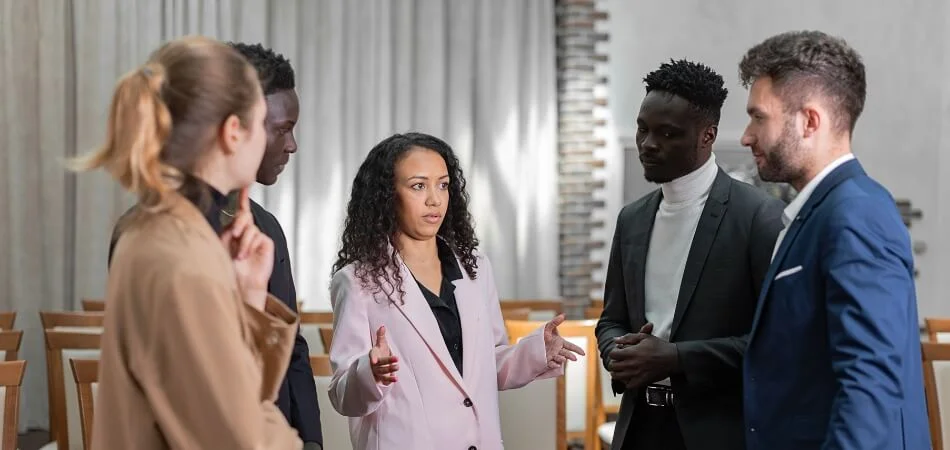Organizing a successful conference is no easy task. It requires careful planning, strategic coordination, and a dedicated team. The key to a successful conference lies in assembling the right committees. So, what committees are needed to plan a conference?
There are usually several committees involved in planning a conference. These committees are usually responsible for logistics, program and content planning, marketing and promotion, registration, and finance. A successful conference is ensured by these committees.
Are you curious to dive deeper into the topic of conference planning committees? Join us as we explore each committee’s role in detail and provide valuable insights to make your conference a resounding success!
Roles of Committee Members of a Conference
A conference’s success depends on the roles played by committee members. Each member is tasked with specific responsibilities that contribute to the smooth execution of the conference. These roles typically include organizing logistics, managing content and speakers, overseeing marketing efforts, and ensuring a smooth registration process for attendees.
Each committee member’s role is clearly defined, and their responsibilities are essential to the event’s success. Regular communication and collaboration help to ensure that everyone is on the same page and working towards the same goals. This structured approach allows each member to focus on their specific tasks, ensuring nothing is forgotten.
Basically, the conference planning committee is the backbone of the event, bringing together different roles to work toward a common goal. Their collective expertise and dedication ensure that every detail is attended to, from securing venues to managing on-site support. This teamwork is crucial to creating a successful and memorable conference experience for all attendees.
Significance of Committees in Conference Planning
Committees play an important role in the successful planning and execution of conferences. Their significance cannot be denied, as they bring structure and expertise to every aspect of the event, ensuring its smooth operation and success.
Efficient Division of Responsibilities
A committee facilitates the efficient division of responsibilities among members, ensuring that all aspects of conference planning receive the attention they deserve. This division of labor prevents fatigue and allows each committee to specialize in its area, resulting in a well-rounded event.
Expertise and Specialization
Members of the conference planning committee bring a variety of expertise and specializations to their respective fields, which improves the quality of the conference planning process. The program/content committee, for instance, utilizes the expertise of subject matter specialists to design engaging sessions and secure knowledgeable speakers.
Effective Time Management
Committees streamline time management by allowing members to focus solely on their designated tasks. This specialization results in quicker decision-making and timely execution of plans. For instance, the marketing/promotion committee concentrates on promotional strategies and outreach, optimizing the timeline for attracting attendees. This approach is especially crucial for international events like conferences in Canada, USA, or any other country, where efficient coordination plays a key role in their success.
Improved Problem-Solving
Challenges and unexpected issues can arise during conference planning. Committees excel in problem-solving, thanks to their collective knowledge and experience. When faced with challenges like last-minute venue changes or technical glitches, committee members collaborate to find effective solutions.
Increase Attendee Experience
The significance of committees lies in the increased attendee experience. Their careful planning and attention to detail ensure that attendees enjoy a smooth, informative, and memorable conference. From smooth registration processes to engaging content and well-organized logistics, committees contribute to a positive impression on attendees.
Committees are the backbone of conference planning, offering efficient distribution, expertise, and complete management. Their dedication and collective efforts result in successful conferences that leave a lasting and positive impact on attendees.
What Committees Are Needed to Plan a Conference?
Planning a successful conference is a multifaceted endeavor that demands a well-structured approach. At its core, this approach relies on the strategic coordination of various committees, each assigned a specific role to ensure the event’s smooth execution. Here is the exploration of what committees are needed to plan a conference:
Logistics Committee
The logistics committee focuses on the physical aspects of the conference, including venue selection, setup, transportation, and hotels. They work hard to ensure that attendees have a comfortable and smoothly run event. This includes arranging seating, displaying signs, and managing any transportation logistics for off-site activities.
Program/Content Committee
This committee is responsible for choosing the conference’s content. They select speakers with expertise in relevant topics, organize diverse and engaging sessions, and play a key role in structuring a conference agenda as well. This provides valuable information and memorable experiences for attendees. Their goal is to inspire and educate.
Marketing/Promotion Committee
A marketing/promotion committee’s role is to promote the conference. They utilize various marketing channels such as social media, email campaigns, and partnerships to attract a diverse audience. Additionally, they design engaging messaging and visuals to generate excitement and boost attendance.
Registration Committee
Managing attendee registration is crucial for a hassle-free conference experience. The registration committee handles sign-ups, ticketing, and attendee inquiries, ensuring a seamless registration process. They also oversee badge printing and distribution, making it easy for attendees to access sessions.
Finance Committee
Keeping the conference within budget is the finance committee’s responsibility. They carefully manage funds, monitor expenses, and ensure that financial resources are allocated efficiently to meet the event’s goals. This includes negotiating contracts with vendors and sponsors.
Technology/AV Committee
In the current tech-driven society, the technology/AV committee is vital. They handle audiovisual equipment, live streaming, and technical support, ensuring that the conference runs smoothly in a digital environment. Their expertise ensures that presentations and sessions are visually and audibly top-notch.
Volunteer Committee
Conference success relies heavily on volunteers. The volunteer committee recruits, trains, and coordinates volunteers who provide on-site support, guide attendees, and assist with various tasks. They are the friendly faces attendees can turn to for help.
These committees are the backbone of conference planning, each playing a crucial role in different aspects of the event. Their collaborative efforts ensure that every detail, from logistics to content and promotion, is meticulously managed to create a memorable and successful conference experience for all attendees.
How to Plan a Conference With the Coordination of Committee Members?
Planning a conference that runs smoothly and leaves a lasting impact requires effective coordination among committee members. Here’s a step-by-step guide to help you achieve success in conference planning.
Step-1. Committee Formation
Start by assembling committees for logistics, program/content, marketing/promotion, registration, finance, and technology/AV. Assign roles and responsibilities based on each committee’s expertise and strengths. For example, the logistics committee may include professionals experienced in event coordination, while the program/content committee could comprise subject matter experts.
Step-2. Goal Setting
Define clear objectives for the conference. What are you aiming to achieve? Whether it’s knowledge sharing, networking, or fundraising, setting specific goals guides the planning process and ensures everyone is on the same page. Communicate these goals to all committee members to align their efforts.
Step-3. Regular Meetings
Schedule regular committee meetings to discuss progress, address challenges, and make decisions collaboratively. Effective communication is key to keeping the planning process on track. Use tools like project management software or video conferencing for remote collaboration.
Step-4. Task Delegation
Assign tasks within committees and set deadlines. Make sure each committee knows its responsibilities, from securing speakers and vendors to handling registration logistics and marketing strategies. This process ensures that no aspect is forgotten and that everyone has a clear role.
Step-5. Budget Management
The finance committee plays a crucial role in budget management. Work closely with them to distribute resources wisely, track expenses, and secure sponsorships to support the event financially. Also, this step helps in preparing the conference business planning, to ensure the event’s financial success.
Step-6. Testing and Rehearsals
As the conference date approaches, the technology/AV committee should conduct equipment tests and rehearsals to ensure smooth presentations, livestreaming, and technical support. Address any technical issues proactively to avoid disruptions during the event. This meticulous preparation guarantees a seamless conference experience.
By following these steps and raising effective committee collaboration, you’ll be well on your way to planning a successful conference that meets its goals and leaves a positive impression on attendees. Effective committee coordination is the key to achieving a well-executed event that fulfills its objectives.
Common Mistakes to Avoid While Coordinating Committee Members
Effective coordination among committee members is essential for a successful conference. However, it’s crucial to be aware of common mistakes to avoid.
- Lack of Clear Roles: Failing to define clear roles and responsibilities within committees can lead to confusion and overlapping efforts, hampering productivity and progress.
- Poor Communication: A lack of communication can lead to missed deadlines and misunderstandings. Regular updates and transparent communication channels are vital for coordination.
- Ignoring Expertise: Decisions can be inefficient if committee members’ expertise is ignored. Valuable insights and skills should be employed for better outcomes.
- Micromanagement: Unnecessary management can kill creativity and initiative. Trusting committee members to fulfill their roles is essential for productivity and morale.
- Unrealistic Expectations: Setting overly demanding goals or timelines can create challenges for committees. Realistic planning ensures achievable results without unnecessary stress.
- Budget Mismanagement: Poor financial control can lead to overspending or resource shortages. Regular budget reviews and prudent spending are critical.
- Ignoring Feedback: Avoiding feedback and suggestions from committee members can limit improvements. An open and receptive approach creates collaboration and innovation.
Avoiding these common mistakes is crucial for effective committee coordination, ensuring a smooth and successful conference planning process.
FAQs About Committees Needed to Plan a Conference
Planning a conference involves coordinating multiple committees, each playing a vital role in the event’s success. Below are some frequently asked questions that dive deeper into the specific committees involved and their responsibilities.
What is the Role of a Sponsorship Committee in Conference Planning?
Financial support from external partners is secured by the Sponsorship Committee. This includes identifying potential sponsors, creating sponsorship packages, and maintaining relationships. Their efforts help fund the event, improve its offerings, and provide added value for both attendees and sponsors.
How Does the Hospitality Committee Improve the Attendee Experience?
During the event, the Hospitality Committee focuses on the comfort and satisfaction of attendees. They manage guest services, coordinate welcome activities, and manage food and drink arrangements. Their attention to detail ensures attendees feel valued and enjoy a smooth conference experience.
What Responsibilities Does a Volunteer Committee Have?
There is a Volunteer Committee that recruits, prepares, and organizes volunteers during the conference. Their duties include managing on-site logistics, providing attendee support, and ensuring smooth operations. This committee is essential for handling various tasks that contribute to the event’s success.
How Does the Content Review Committee Ensure Quality?
All conference materials, including presentations, papers, and marketing content, are reviewed and approved by the Content Review Committee. They ensure the content aligns with the conference’s theme and objectives, maintaining a high standard of quality and relevance throughout the event.
How Does the Social Media Committee Boost Conference Visibility?
Managing the conference’s online presence is the responsibility of the Social Media Committee. They create and share content, engage with potential attendees, and promote the event across various social platforms. Their efforts increase visibility, drive registration, and keep the audience informed and excited.
Final Word
Committees are the backbone of successful conference planning. They bring diverse expertise, efficient delegation, and detailed management to the table, ensuring conferences run seamlessly. Each committee focuses on its specific areas, such as logistics, content, or marketing, contributing valuable insights and skills to the event’s overall success.
When considering “What committees are needed to plan a Conference?” keep in mind that various committees play important roles in creating a memorable event experience. They collaborate effectively to ensure the conference’s success.
Avoiding common issues such as unclear roles and ineffective communication allows you to maximize committee efficiency, ensuring your conference attains its objectives and leaves a lasting impact on attendees. Effective committee collaboration is the foundation of a smooth and successful event.








